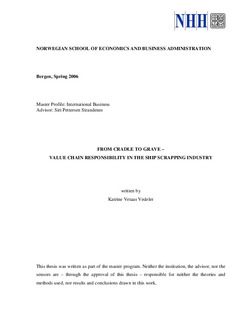| dc.description.abstract | The World fleet plays a crucial role in the world economy. With growth in world trade the world economy has expanded, facilitated largely by shipping. The profitable trading life of a ship, however, is limited to 25-30 years. Each year approximately 3.5 to 4 % of the world fleet or 4,000 vessels are sent to recycling yards around the world. The majority of commercial vessels
are dismantled in Asian countries where health and safety and environmental protection standards remain unacceptably low by developed world standards. At present, however, there are
few viable alternatives, with recycling facilities in the developed world incapable of dismantling the largest ships, and current IMO legislation remaining voluntary and difficult to enforce. In this
thesis the value chain responsibility of shipping companies will be discussed in the context of the current industry conditions in terms of market circumstances and legislative landscape. | en |
